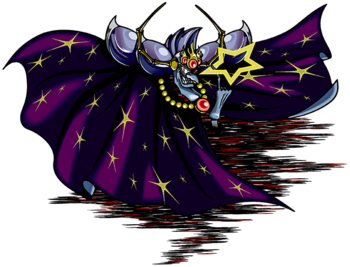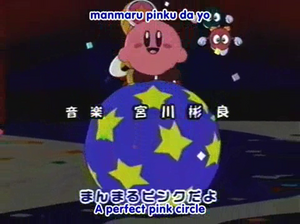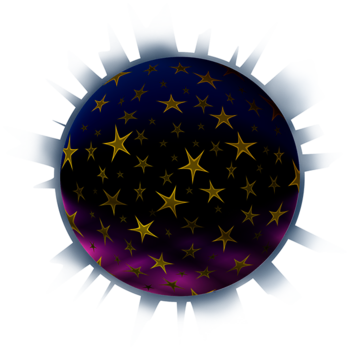
The official discord link if you wish to join the discord: https://discord.gg/j5RKwCvAFu
Support the wiki on our official Ko-Fi page or Patreon page!
Nightmare (Kirby)
From The Codex
Background
Nightmare is a Final Boss and major character in the Kirby series, despite only making three major appearances in the games. His goal is to spread dark nightmares and influences throughout the galaxy, and uses his cunning wit to accomplish the feat.
In his debut, Nightmare is responsible for corrupting the Fountain of Dreams and attempting to spread his nightmares all across Dream Land. King Dedede tries to stop Nightmare from succeeding by breaking the Star Rod, but Kirby unwittingly summons Nightmare when he returns the Rod to the tainted Fountain, and has to defeat Nightmare before his evil plans become reality.
Nightmare has had notable appearances in Kirby's Adventure, its remake, and Kirby Mass Attack, and has been featured in a number of cameos in other games.
| This dropdown contains the synopsis of Nightmare’s story. Read at your own risk as you may be spoiled otherwise! |
|---|
|
Kirby: Nightmare in Dreamland
In these games, Nightmare takes control of the Fountain of Dreams in an attempt to extend his control over Dream Land. Trying to prevent this, Dedede breaks the Star Rod and scatters it around Dream Land, temporarily leaving Nightmare unable to take control and seems to trap him inside the Fountain of Dreams. Kirby, unaware of Dedede's intentions, restores the Star Rod and places it back in the fountain. With the Star Rod back in place, Nightmare reveals himself. Nightmare and Kirby then fly into space (Kirby did this with the help of Dedede). In his Power Orb form, Nightmare, for the most part, stays on the right side of the screen, shooting empty blue stars at Kirby. Nightmare may also shoot a sonic wave, which is faster and is a bit wider than the star attack. Nightmare repeatedly moves from one spot to another while using this attack. The fight is similar to the fight with Kabula in Kirby's Dream Land, but with a time limit, for the entire battle takes place in the planet's atmosphere as the two are falling to Popstar's surface. As such, if Kirby doesn't deplete Nightmare's health bar in time, Nightmare will flee and Kirby will crash into the ground and lose a life. After the final blow is struck, Nightmare retreats and flies to Popstar's moon. Kirby follows close behind on a Warp Star. As Kirby pursues him, the Power Orb suddenly metamorphoses into his true form. After knocking Kirby from his Warp Star and onto the surface of the moon, Nightmare teleports in close to finish him off, effectively beginning the second phase of the battle. In his second form, Nightmare attacks Kirby by shooting stars at him, ramming into him, and using his tornado-like core to drill into him. He takes fewer hits to defeat than in his first form, but can only be damaged by hitting his weak spot, the accumulation of darkness at his core, which is usually protected by his impenetrable cloak. He briefly reveals his weak spot during each of his attacks. After Kirby lands the finishing blow, Nightmare's body explodes, destroying a huge portion of the moon as a result. After this, Kirby returns to the Fountain of Dreams, places the Star Rod back in there, and everything returns back to normal. Kirby's Avalanche
Kirby: Canvas Curse
Kirby: Squeak Squad
Kirby Mass Attack
Super Kirby Clash
|
General Information
Name: Nightmare, Nightmare Wizard
Origin: Kirby's Adventure
Sex: Male
Age: Unknown
Classification: Nightmare, Boss
Species: Unknown
State of Being: Regular
Occupation: None
Enemies: Dream Land, Kirby, King Dedede
Status: Deceased (Killed by Kirby)
Alignment: Neutral Evil (Nightmare is a villain that wants to spread dark nightmares and influences throughout the galaxy, and uses his cunning wit to accomplish the feat, having no regard for anyone's safety and attempting to kill Kirby in a self-destruct)
Codex Statistics
Key: Kirby’s Adventure/Nightmare in Dreamland | Strato Patrol EOS
Tier: Low 5-B | Low 5-B
Dimensionality: 3-D
Attack Potency: Small Planet level (Fought against Kirby, who can crack Pop Star in half with splitting the earth in half being calculated at this level. His death destroyed a huge portion of the moon which was calculated at this) | Small Planet level (Can fight Post Super Star Kirby)
Durability: Small Planet level | Small Planet level
Striking Strength: Small Planet Class | Small Planet level
Lifting Strength: Unknown | Unknown
Travel Speed: Faster Than Light (Can keep up with Kirby on his warp star) | Faster Than Light
Combat Speed: Faster Than Light | Faster Than Light
Reaction Speed: Faster Than Light | Faster Than Light
Stamina: Unknown
Range: Standard Melee Range, Several Meters with Star Projectiles and Energy Projection, Kilometers with Self-Destruction (Destroyed a portion of the moon)
Intelligence: Unknown
Powers and Techniques
Superhuman Physical Characteristics, Flight & Spaceflight (Can freely fly around), Self-Sustenance (Respiratory Self-Sustenance; Can breathe in space), Transformation & Healing (Can transform from an orb into his wizard form. This transformation also fully heals him), Energy Projection (Can shoot out star like projectiles, and energy waves), Curtain Fire (Can shoot out dozens of star projectiles), Homing Attack (Can create large energy orbs that follow Kirby around), Earth Manipulation (Can summon large meteor like objects and fling them at his opponent), Attack Reflection (His cape can reflect attacks from the Star Rod), Teleportation (Can teleport around), Self-Destruction (His defeat caused his self-destruction)
Other
Standard Tactics: Nightmare starts in his orb form shooting star projectiles and energy beams, once his orb form is defeated he transforms into his Wizard form where he teleports around shooting a massive amount of energy beams, large homing orbs, and throwing meteors. Attacking his cape will cause one’s attack to reflect.
Weaknesses: The Star Rod.
Trivia
- In the Japanese version of the anime's last episode, Nightmare says the following lines while Tiff, Kirby and the others are escaping his fortress: "True to my name, I am but a dream that lives in your heart. Therefore, I am immortal. For as long as there is fear in your heart, I will someday return." These lines were edited out of the dub.

- Nightmare's Power Orb form makes a cameo in the first Japanese intro of the anime. It is a circus ball that Kirby and Tiff walk on. As with other elements in the anime, the Power Orb is based on Kirby's Adventure’s design, as Kirby: Nightmare in Dream Land had not yet been released at the time.
- Nightmare is fought on Popstar's moon—the same battlefield where Kirby would later fight Marx. This detail is lost in Kirby: Nightmare in Dream Land, which, although still having the battle take place on the moon, changed the background to the point where the battlefield no longer resembled the way it was depicted in Kirby's Adventure and Kirby Super Star.
- In the English version of Kirby: Nightmare in Dream Land, he is known as "the Nightmares," implying the name refers to a collective of negative consciousness or entities. This is thought to be a translation goof, as the NES translation remained perfectly accurate when keeping his Japanese name.
- Furthermore, preliminary sketches for Kirby: Nightmare in Dream Land also refer to him as "The Nightmare."
- Dark Mind, the final boss of Kirby & The Amazing Mirror, has a form which looks very similar to Nightmare.
- The first phase of the battle with Nightmare is fought in a manner similar to the pattern used to battle Kabula. This shooter style would later be used in the battles with Dark Matter, Zero, Kracko (in Kirby's Epic Yarn), and the Lor Starcutter.
- In the English version of the anime, Nightmare is known as eNeMeE and the capitalized letters in his name is an abbreviation that represents the name of his company called Nightmare Enterprises.
- It may also be a pun on enemy, similar to how N.M.E. is pronounced.
- Nightmare's sprites in Kirby's Adventure are somewhat transparent, allowing the stars in the background to show through his cloak. This may be an attempt at recreating his official artwork at the time, where stars are imprinted on his cloak. This effect is no longer present in the remake, and his cloak is now simply a solid, dark purple color.
- In the anime, Nightmare retains some of his abilities, such as flying and being invincible to anything except for the Star Rod, but he (like some of the monsters that appear in the anime) gains new abilities, like hypnotizing other people, and instead of firing stars from his hands, he fires lightning beams.
- Both forms of Nightmare appear as collectible rare keychains in Kirby: Triple Deluxe, using his sprite from Kirby: Nightmare in Dream Land (Wizard), and Kirby's Adventure (Power Orb). Additionally, his Power Orb form appears as one of the possible balloon animals that Circus Kirby makes.
- In Super Smash Bros. for Nintendo 3DS and Wii U, Nightmare's Power Orb form is a 3D model, but his Wizard form is a 2D sprite.
- Concept artwork seems to suggest that Nightmare was considered as a playable character for Kirby: Canvas Curse.[1]
- Nightmare appears as a collectible sticker in Kirby: Planet Robobot.
- In the Japanese version of the anime, Nightmare/eNeMeE and the N.M.E. Sales Guy share the same voice actor, Banjo Ginga.
- Later in Super Kirby Clash, Ginga would reprise his role as Parallel Nightmare, a counterpart of Nightmare from Another Dimension.
- Nightmare's battle theme received a remix in Kirby: Canvas Curse where it plays in the penultimate stage in the game, Spectacle Space. Also, when fighting Drawcia Soul with the Old School option on, Drawcia Soul's theme is replaced with Nightmare's theme from Kirby: Nightmare in Dream Land. A remix of Nightmare's battle theme also plays when fighting Morpho Knight as either King Dedede, Bandana Waddle Dee or Meta Knight in Kirby Star Allies. This remix was added in version 4.0.0.
- While various pieces of artwork depict Nightmare with arms, he lacks them in all of his in-game appearances apart from in the Super Smash Bros. series, which, even then, is a motionless piece of artwork.
Reference
Battle Records
None.
None.
None.

